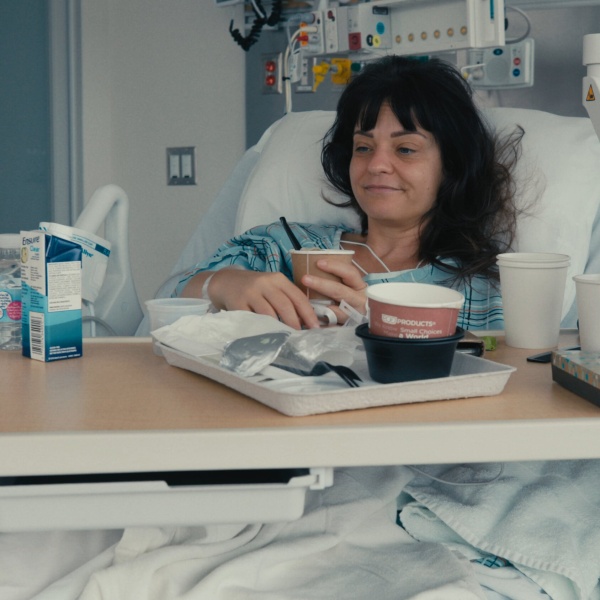
Independent filmmaking has become somewhat hyper-obsessed in the last few years with “realism.” Lighting rigs have been put away, available light filling in where it will and scripts tossed out for sketches, shaped by improvisation in an attempt to capture as close to an approximation of real human interaction as possible. It’s an admirable approach and not just limited to “mumblecore” movies — Terrence Malick has followed this path pretty closely throughout this career. However, the risk in this style is that if it’s too loose, it can structurally crumble the emotional and narrative focus. And for “Humpday” director Lynn Shelton‘s “Your Sister’s Sister,” that’s the unfortunate result of the ten day shoot on the film that gathered together a game cast — Emily Blunt, Rosemarie DeWitt and Mark Duplass — and sets them loose on a good dramatic premise ill-served by a far too casual approach.
A year after his brother’s death Jack (Duplass) is still smarting from the loss of his sibling. At a one year commemoration of the funeral Jack, fueled by confused emotions and mostly alcohol, let’s loose and gives an all time bad/awkward toast in a genuine attempt to proudly honor his departed. Needless to say it’s doesn’t go over very well, but there to call him on his shit is Iris (Blunt), his best friend who also happens to be his brother’s ex-girlfriend. Sensing that Jack needs to pull himself together, Iris sends him packing on a trip to her family cabin, ordering him to spend a week there in solitude to think about this life and where he wants to go.
Jack readily accepts this proposition, hops on his bike and heads to the cabin, but is in for a surprise, as when he arrives Iris’ sister Hannah (DeWitt) has beat him there by a day, retreating to get over the recent dissolution of her seven year relationship. Though she’s quite the opposite from Jack — a vegan and oh yeah, a lesbian as well — there is nothing a bottle of hard liquor can’t fix and as the drinks keep flowing that first night together, it’s not long before they drunkenly, messily and awkwardly have sex. But there is one more surprise for both of them in store: Iris arrives the next morning unannounced and suddenly the delicate balance between close siblings and best friends is in trouble.
As we mentioned, the actual concept of the story is quite good but unfortunately Shelton takes far too long to get it in motion. We recently saw Whit Stillman‘s “Damsels In Distress,” one of the most dialogue heavy movies of the year, but because the words on the page are so witty, funny, unique and engaging — and never get in the way of moving the picture forward — it always remains compelling to watch. But Shelton’s narrative does not benefit in the same regard. The opening party and the night at the cabin before Iris arrives easily comprise the first third of the film, but nothing justifies the luxurious length of time it spends here, basking in its talky, chatty scenes (for a moment, it was going on so long we were beginning to wonder if Blunt’s appearance was merely going to be cameo). Duplass and DeWitt share great chemistry and are mildly amusing as they trade stories and smart remarks, but there is nothing here that you wouldn’t find when overhearing two friends talk at a hip coffee shop. Realistic? Perhaps. But even at a coffee shop you tend to zone those overheard conversations out, and we found ourselves doing the same here as they kept going on (and on and on).
And it’s this relaxed pacing that slows down the middle third of the film as Hannah and Jack struggle with whether or not to tell Iris what happened. Waiting for a character on screen to find out what the audience already knows is always a tricky proposition, especially when it’s required to get the rest of the story moving and with more revelations to take place. In this case, we have to wait until there is about fifteen or twenty minutes left in the film for Iris to get clued in. And what happens then? A montage. That’s right, just when the film finally contrives a situation where the complex emotions and relationship ties between everyone involved can really be developed and explored — and where dialogue would be more than welcome — much of this is tidily wrapped up in an extended sequence set to the music by Vinny Smith that alternates between all their characters until everyone eventually decides they aren’t mad at each other anymore. And it’s such a shame because Mark Duplass gets a great and very moving confession scene towards the end of the film, that might be the best piece of acting so far in his career. It’s a great moment and made us wonder how much more interesting this film would have been if focused on the dynamics and drama between the characters rather than just trying to naturally capture their interactions in what amounts to largely non-essential scenes.
Tagged with an ending that leaves the resolution up for the audience to decide, “Your Sister’s Sister” ultimately feels somewhat cobbled together and despite great performances by the trio of leads, never gains the emotional pull or depth it strives for. The texture brought by the performances certainly goes a long way, but without a structure to properly zero in on where the strongest story elements are, Shelton’s film misses the mark, making getting to know “Your Sister’s Sister” hardly worth the time. [C]

